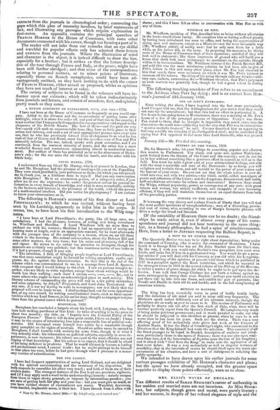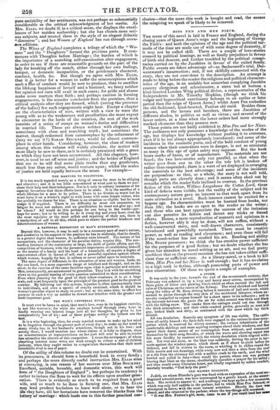MRS. ELLIS'S WIVES OF ENGLAND.
THE different results of SARAH STICKNEY'S career of authorship in her maiden and married state are not incurious. As Miss STICE■ NET, her subjects, though grave and moral, were purely literary ; and her success, in despite of her refined elegance of style and the pure amiability of her sentiments, was not perhaps so substantially considerable as the critical acknowledgment of her merits. As Mrs. Elias, we doubt if, in a critical sense, she displays the excel- lences of her maiden authorship ; but she has chosen more seri- ous( subjects, and treated them in the style of an elegant didactic "discourse"; and her Women of England has run through seven- Semi editions.
The Wives of England completes a trilogy of which the " Wo- men " and the "Daughters" formed the previous parts. It com- mences with Thoughts before Marriage ; the burden of which is the importance of a searching self-examination after engagement, in order to see if there are reasonable grounds on the part of the lady for breaking off the match, either through her own feelings, temper, or domestic incapacities, or the gentleman's character, conduct, health, &c. But though we agree with Mrs. Eters, that it ;is better for a woman to suffer the misconceptions which such a line of conduct would be sure to produce, than to sacrifice the lifelong happiness of herself and a husband, we fancy neither her opinion nor ours will avail in such cases; for pride and shame make more martyrs than faith; and perhaps caution in forming engagements, is the sounder conclusion from the premises, than a critical analysis after they are formed, which (saving the presence of the ladies) few such engagements might bear. Except a chapter on the characteristics of men, written with a view to warn the young wife as to the weaknesses and peculiarities she must expect to encounter in the lords of the creation, the rest of the work consists of a series of essays on woman's duties and difficulties in married life. These are always written with elegance, and sometimes with close and searching truth ; but sometimes the matter, though redeemed from commonplace by the refinement of (may we say it ?) SARAH STICKNEY, would be almost common- place in other hands. Considering, however, the class of readers among whom this volume will widely circulate, the matter will most likely be new to them, as it is certainly presented with a grace to which they have not been accustomed. All this elegance, how- ever, is used to set off sense and justice ; and the brides of England that are to be will find more plain truths than any gentleman, much less than any suitor' would venture upon; whilst the scales of justice are held equally between the sexes. For example-
TUE MARTYRS TO POLITENESS.
It is too much regarded merely AS a thing of course for men to be obliging and attentive; and it is too little remembered at what cost to them we pur- chase their help and their indulgence. Nor is it only in solitary instances or for especial favourites that these efforts have to be made. It is the sacrifice of a whole lifetime for a man to be polite. There is no fireside so warm but he must leave it on a winter's night to walk home with some female viaiter, who has probably no charm for him. There is no situation so eligible but he must resign it if required. There is no difficulty he must not encounter, no fatigue he must not endure, and no gratification he must not give up; and for whom ? AU would do this perhaps for one being in the world—per- hops for more ; but to be willing to do it every day and every hour, even for the most repulsive or the most selfish and requiring of their sex, there is martyrdom of self in all this, which puts to shame the partial kindness and disinterestedness of woman.
• RATIONAL EXPOSITION OF MAN'S SUPERIORITY.
Beyond this, however, it may be said to be a necessary part of man's nature, and conducive to his support in the position he has to maintain, that he should, in a greater degree than woman, he sufficient unto himself. The nature of his occupations, and the character of his peculiar duties, require this. The con- tending interests of the community at large, the strife of public affairs, and the competition of business, with the paramount importance of establishing himself as the master of a family and the head of a household, all require a degree of concentrated effort in favour of self, and a powerful repulsion against others, which woman, happily for her, is seldom or never called upon to maintain.
The same degree of difference in the education of men and women, leads, on the one hand, to a more expansive range of intellect and thought, and on the other, to the exercise of the same faculties upon what is particular and minute. Men, consequently, are accustomed to generalize. They loak with far-stretching views to the general bearing of every question submitted to their consideration. Even when planning for the good of their fellow-creatures, it is on a large scale, and most frequently upon the principle of the greatest good to the greatest number. By following out this system, injustice is often unconsciously done to individuals, and even a species of cruelty exercised, which it should be woman's peculiar object to study to avert ; but at the same time, to effect her i
purpose n such a way as neither to thwart nor interfere with the greater and more important good.
THE WIFE'S UNIVERSAL RIVAL. THE WIFE'S UNIVERSAL RIVAL.
It must ever be borne in mind, that man's lore, even in its happiest exercise, IS not like woman's; for while she employs herself through every hour in fondly weaving one beloved image into all her thoughts, he gives to her comparatively few of his; and of these perhaps neither the loftiest nor the
best. • s It is a wise beginning, then, for every married woman to make up her mind
to be forgotten through the greater part of every day ; to make up her mind to many rivals, too, in her husband's attentions, though not in his love : and among these, I would mention one whose claims it is folly to dispute, since no remonstrances or representations on her part will ever be able to render less attractive the charms of this competitor. I mean the newspaper; of whose absorbing interest some wives are weak enough to evince a sort of childish jealousy, when they ought rather to congratulate themselves that their most formidable rival is one of paper.
Of the utility of this volume no doubt can be entertained. With its precursors, it should form a household book in every family ; and perhaps the more directly useful instruction Mrs. Emus aims at conveying, is one reason of her success over Miss STICILNEY. Excellent, amiable, loveable, and domestic wives, this work will form of" the Daughters of England"; but perhaps its tendency is rather to induce the Sons to wait for its effects upon another gene- ration. There is evidently so much to be required from a good wife, and so much to be done in forming one, that Mrs. Ems may lead prudent bachelors to leave well alone, or to bear the Ma they have, till her hortations have removed the blanks from the loCtery of marriage : which leads one to this further practical con- clusion—that the more this work is bought and read, the sooner the misgiving we speak of is likely to be removed.



























 Previous page
Previous page